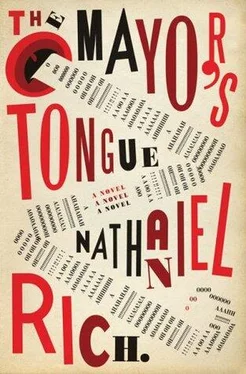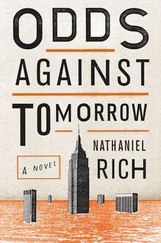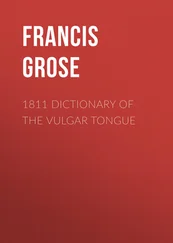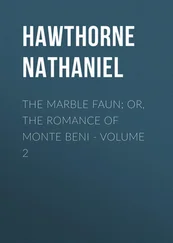Keftir is silent, but his hands fumble over his face and under his glasses. To Sorokin, writes Eakins, "it looks as if Keftir were using his knuckles to knead his eyeballs deep into his brain." Sorokin fears he's caused pain, but when Keftir looks up, it's clear that the artist is crying tears of joy.
A week later Sorokin performs the surgery. Keftir convalesces, with the help of heavy painkillers, at Sorokin's lab, his entire head wrapped in bandages. After a few weeks, a nurse wheels Keftir into a circular, subterranean chamber sealed off from any light source. A second nurse trundles in a wheelbarrow filled with clunky plastic objects that protrude copper plugs. They are shaped like animals: elephants, giraffes, hippopotamuses, and tyrannosaurs. The nurses, holding the nightlights in their hands, stand along the walls of the room, their mouths slack with anticipation. Sorokin positions himself next to Keftir, holding a pair of scissors. A nurse flips a switch, and the lights go out.
Sorokin cuts off the bandage and, one by one, the nurses plug in the nightlights. The first, a blue cow, is so dim that its aura does not even reach across the room to Keftir's wheelchair. The second, a red antelope, causes Keftir to moan in pain.
Sorokin orders the nurses to plug in a third light, and Keftir protests: he says he's in agony.
"It's not pain you're feeling," says Sorokin, with great solemnity. "It's vision."
One by one the nurses plug the animals into the band of outlets. An electric menagerie flickers into being. To the nurses' astonishment, Keftir starts to laugh.
"Is he dying?" asks one of the nurses.
"No," says Sorokin. "He's confused — he can see only pale forms and shadows. Later, when his eyes have developed more fully, everything will become clearer."
"But I can see perfectly now," says Keftir. "What marvelous animals."
The nurses cheer.
After some further rehabilitation, Sorokin decides that Keftir is ready to be exposed to daylight. He wheels Keftir into his private garden, under the hanging boughs of a live oak tree. Sorokin then hands Keftir a pile of matted drawings and sketches— prints of Keftir's most renowned works. He has purchased them at the gift shop of the nearby art museum.
Keftir is confused. "The colors," he says, "they're faded." Sorokin explains that Keftir's sensitivity to color may still be partially impaired, but Keftir isn't placated. He demands that Sorokin give him a glass of water, without ice.
Sorokin runs off, leaving Keftir amid the dappled sunlight under the bright-green leaves of the live oak. Sorokin returns with the glass, and rests it on the armrest of Keftir's wheelchair. Keftir watches, not breathing, as the surface of the water trembles slightly and rocks back and forth in its container; after some seconds it becomes still.
"The water," he gasps, "the water!"
"Just like your pictures."
"No — just now — it was flat. Completely flat."
"Yes," says Sorokin, "but now, the second you talk about it, it is bouncing about right there on your chair, look at that, and even spilling, oh dear—" And the glass falls to the soil.
But Keftir does not notice the glass falling, doesn't even feel the water spill on his bare foot. He sits stock upright and glances around him "like a drunk who has awoken in a place he has never seen before, without remembering how he got there or even who he is." Keftir, defiant, slams his eyes shut. He refuses to open them again until his implants are carved out and the cataracts, mistlike, begin to spread over his eyeballs once more.
Alison came by the office one afternoon to help Abe revise a chapter he'd drafted about Eakins's Hollywood years. Eugene watched them work together from across the room, where he pretended to be copyediting a previous chapter. Alison was sweet with her father. She made each of her editorial suggestions with great delicacy, posing her criticisms in a gentle, self-deprecating manner. "It's probably my own obtuseness," she'd say, "but I don't understand exactly why you've decided to go on at such great length about Eakins's firsthand research for Humboldt in the Amazon. Perhaps the section could be shorter?" Or, "Is it really possible that Eakins not only got Elizabeth Taylor pregnant, but delivered their child as well? I'm sure it's just me being foolish, but maybe it would help to have more evidence."
Abe would pat his daughter softly on the back of her hand and say something like "No, my dear, don't doubt yourself, you're right on this point." And Alison would smile secretly to herself as her father marked the change.
Abe left early for bed, but Alison lingered for some time, making further edits on her father's manuscript, rewriting passages, and even, it seemed to Eugene, writing entire new paragraphs. Eugene finally convinced himself to approach the desk, and uttered her name. He realized as soon as it crossed his lips that he was surprised to hear the word spoken aloud, in his own voice.
Alison looked up. She had heard him coming.
"Actually no one calls me Alison except for my father," she said. "You can call me Sonia."
"Right. Sonia, then." Eugene said her new name to himself, and realized he had nothing else to say to her. "So, Sonia. I wanted to ask you, what is Eakins like? I can't believe he's actually alive. Can you tell me where he lives?"
"I don't know."
"What do you mean? Where are you meeting him?"
"Don't you understand?" she asked. A mocking smile played at the corners of her mouth." I've never met the man."
Eugene watched her closely. Her smile froze.
"You mean he's dead?" said Eugene.
"I couldn't say for certain. That is what everyone else seems to think."
"What about the letters?"
"Look, you may work for my father, but you don't see how he really is. He's older now, and maybe a little less patient than he used to be, I realize that, but he was a legend in his time — one of the most respected critics and historians of literature around. He's a passionate, serious man."
"Serious about Eakins, that's for sure."
"Yes, and if it wasn't for Eakins, I'm not sure he would last another month. Eakins keeps him alive. They knew each other since the sixties, when Eakins was living in a houseboat on the Seine and my father was in a flat on the Left Bank. Which is when he met my mother. I think she might have known Eakins. In fact, she might have been quite close to him, at least briefly."
Sonia looked back down at her father's manuscript, as if she had forgotten to fix something there.
"But the letters?" asked Eugene. "Who writes those?"
"Who do you think? The funny thing is, he doesn't even recognize my handwriting."
"You're joking."
"I've gone to 'visit' Eakins four times. I love Italy, I love Trieste, I have friends there. By the central piazza, there's this beautiful boardwalk where I like to sit and read. I meet strangers, practice my Italian, go on adventures. When I come home my father is grateful, content."
Eugene watched her until he was certain that she was telling the truth.
"I had a similar thing happen in my family," he said at last. "My great-grandfather Ozzie — my mother's grandfather — opened a shoe store after he emigrated from Germany. It was called Zrel's Shoes — Zrel was his name, at least according to the authorities at Ellis Island. The store was the pride of my family, their gift to their descendants, the proof that they'd made it in America. All the Zrels worked there. Even my mother, as a young girl.
"The store was destroyed during the 1968 riots. Ozzie was dead by then, and his wife, Lily, was living in an old-age home. My family went to visit her the week of the riots, and realized that no one had told her about what had happened to Zrel's. So they decided not to mention it — no need to make the old lady any more upset. But she stayed alive for a long time after that. Anytime someone visited, Lily would ask how business was going. They'd tell her it was going great. My mother would make up all kinds of stories about our customers and Lily would laugh like a baby."
Читать дальше












